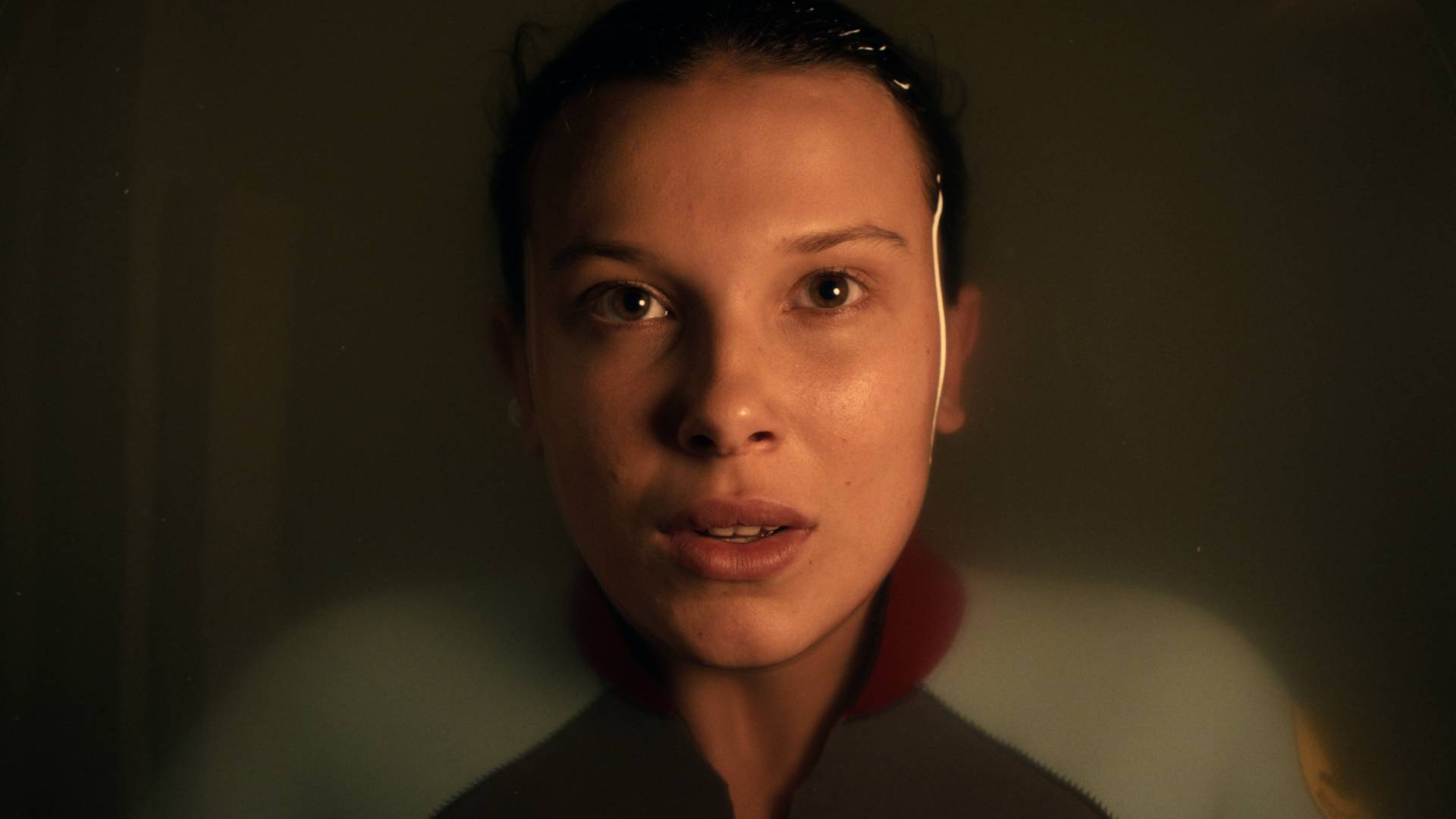30 Books That Should Be Movies
Hollywood's next English assignments...
The Kindness Of Women
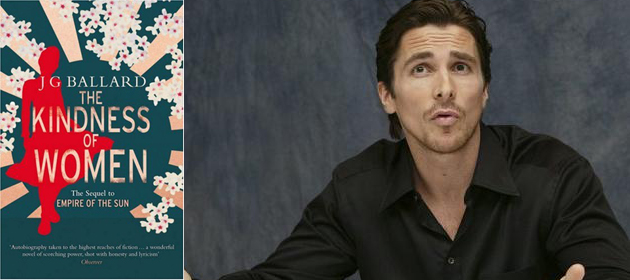
The Book: British author J.G. Ballard’s follow-up to his earlier novel Empire Of The Sun (adapted by Steven Spielberg back in 1987) continues the story of young Jim Graham as he leaves China for a voyage of discovery around England, mainland-Europe and the United States.
A fictionalised account of the author’s own experiences, the book dwells on its twin themes of sex and death as Jim progresses from youthful lustfulness through morbid early-manhood and finally out the other side to a kind of middle-aged contentment.
The Movie: We’d love to see Christian Bale pick up where he left off with this one, although he might be a little too old now to document Graham’s earlier years. In terms of director, Spielberg was initially criticised for failing to adapt a character that audiences could connect with. Perhaps a more contemplative helmer (Ang Lee perhaps) might fare better this time around?
Sample Dialogue: “In Shanghai, from 1937 to the dropping of the atom bombs, we had been neither combatants nor victims but spectators roped in to watch an execution. Those who had drawn too close had been touched by the blood on the guns.”
Junk
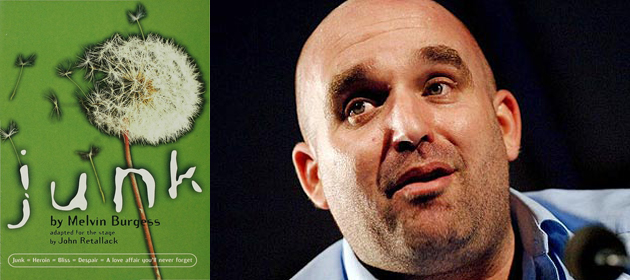
The Book: Melvin Burgess’s unflinching children’s novel tells the story of a group of Bristol-based teenagers who fall into the physical grip of heroin addiction and the mental brainwashing of an anarchist movement.
Encompassing such thorny issues as hard drug use, domestic violence and prostitution, it reads like a teenage version of Trainspotting , as Burgess refuses to water down his subject matter for his young audience.
The Movie: The lead characters are all in their early teens (one of the reason’s the novel is so shocking) so you’d need to cast a set of relative unknowns for this one to work.
It’s already been made as a little-seen TV movie, but we’d like to see Shane Meadows get his hands on it, not least because he’d be unlikely to sanitise any of the story’s grittier elements.
This isn’t a children’s movie, even if it’s a movie about children.
Sample Dialogue: “Try it. You don't have to do it ever again if you don't want to. But try it once. Try everything once…”
A Gate At The Stairs
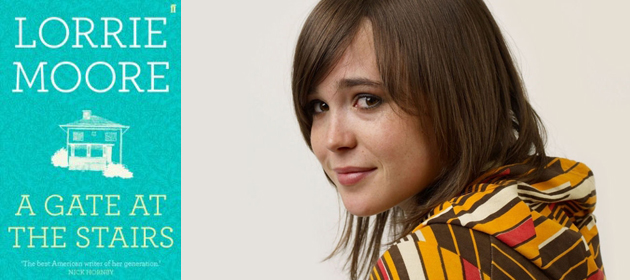
The Book: Lorrie Moore’s Costa Prize-winning novel is the story of one young woman’s coming of age, as narrator Tassie Keltjin reminisces about her stint as a twentysomething babysitter for a middle-aged white couple and their adopted, mixed-race baby.
Set shortly after the events of 9/11, it’s an unsettling yarn about the secrets and prejudices bubbling under the surface of a small, Midwestern community.
The Movie: A brooding, mysterious character piece, A Gate At The Stairs would work well as a low-key family melodrama in the vein of Todd Field’s superlative In The Bedroom .
Ellen Page would be a good fit for the precocious but vulnerable Tassie, whilst casting real-life former-item Susan Sarandon and Tim Robbins as the Brinks (the troubled couple at the heart of the novel) would be an inspired piece of stunt casting.
Sample Dialogue: (On post 9/11 America) “Though the movie theatres closed for two nights, and for a week even our yoga teacher put up an American flag and sat in front of it, in a lotus position, eyes closed, saying ‘let us now breathe deeply in honour of our great country.’
Bringing all the latest movie news, features, and reviews to your inbox
I looked around frantically, never getting the breathing right) mostly our conversations slid back shockingly, resiliently, to other topics: back-up singers for Aretha Franklin, or which Korean-owned restaurant had the best Chinese food.”
Lush Life
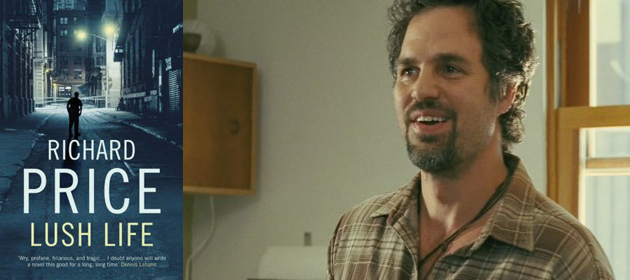
The Book: Penned by Richard Price (author of Clockers and an occasional writer on The Wire ), Lush Life is a pulse-quickening inner-city thriller in which a seemingly open-and-shut murder case stemming from a botched mugging soon expands into a web of complications and suspicion for luckless copper Matty Clark to try and untangle.
Packed with authentically crackling dialogue and boasting an intriguingly twisty-turny narrative, it’s a compelling read throughout.
So much so that even Barack Obama made room for it in his luggage during a 2009 summer holiday.
The Movie: Price’s work has oft been adapted for film and TV, and this would make for a superior big-screen crime thriller. We like Mark Ruffalo for exasperated but decent cop Clark, whilst Sharlto Copley would make for a shifty Eric Cash, the failed actor at the heart of the mystery.
Sample Dialogue: “As a rule he is soft-spoken, leaning in to the driver's window to conversate, to explain, his expression baggy with patience, going eye to eye as if to make sure what he's explicating here is being digested, seemingly deaf to the obligatory sputtering, the misdemeanours of verbal abuse, but ... if the driver says that one thing, goes one word over some invisible line, then without any change of expression, without any warning signs except maybe a slow straightening up, a sad/disgusted looking off, he steps back, reaches for the door handle, and the world as they knew it, is no more.”
Paris Trance
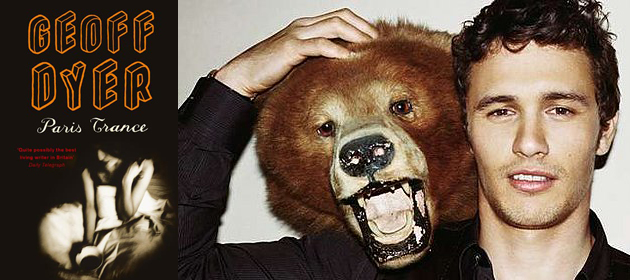
The Book: A dreamy, twentysomething story of love, sex and lounging about from British author Geoff Dyer, as protagonist Luke heads to Paris to write a novel, only to find himself waylaid by beautiful women and mind-altering drugs. It’s a hard life, eh Luke?
The Movie: This one is ripe for a hip, slacker-movie makeover, what with its gleefully geeky dissections of Blade Runner dialogue and bouts of elaborately adventurous sex.
In the novel the lead character is English, although that needn’t be set in stone.
James Franco would be our pick for the role, as he’s got the sort of languid, insouciant charm, not to mention the literary pretensions, of Dyer’s hero.
Sample Dialogue: “When Luke came to Paris with the intention of writing a book based on his experiences of living — as he grandly and naively conceived it — `in exile', he was twenty-six years old (`a fine age for a man,' according to Scott Fitzgerald).
As far as I know, he made absolutely no progress with this book, abandoning it — except in moments of sudden, drunken enthusiasm — in the instant that he began leading the life intended to serve as its research, its first draft.”
Cell
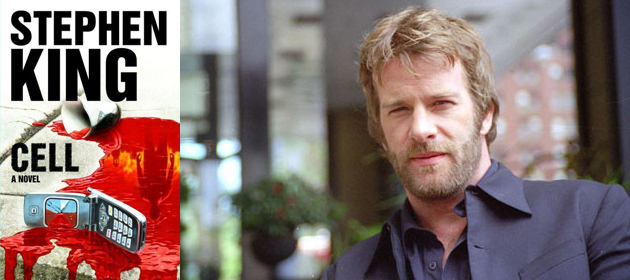
The Book: Stephen King’s later novels may not hit the high notes with as much regularity as those from his late-70’s heyday, but in terms of sheer imagination, he’s still head and shoulders above the majority of his peers.
This 2006 chiller is a novel update on the classic zombie story, with struggling artist Clayton Ridell desperately trying to get him home to his family, after a mysterious signal known as “The Pulse” turns everyone using a mobile phone into bloodthirsty killers.
The Movie: We’re surprised this one hasn’t been snapped up already, seeing as practically every other one of King’s novels has made its way onto the big screen.
Eli Roth was initially thought to be heading up a project back in 2007, but as that came to naught, we’ll have Zack Snyder behind the camera, with Thomas Jane (an excellent lead in underrated King-adap The Mist ) starring as the increasingly desperate Ridell.
Sample Dialogue: “The event that came to be known as The Pulse began at 3:03 p.m., eastern standard time, on the afternoon of October 1. The term was a misnomer, of course, but within ten hours of the event, most of the scientists capable of pointing this out were either dead or insane. The name hardly mattered, in any case. What mattered was the effect.”
The Book Thief
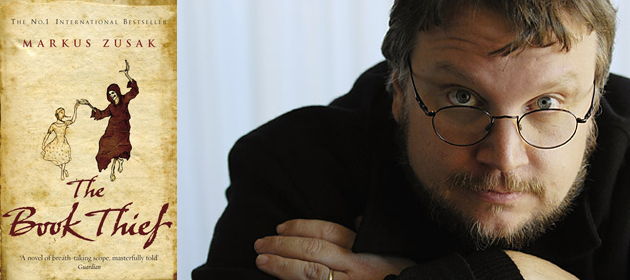
The Book: Aussie author Marcus Zusak’s phenomenally popular (it has been listed on the New York Times’ Children’s Bestseller list for over a hundred weeks) WW2 fable follows the exploits of young Liesel Memminger in Nazi Germany, as she has three fateful meetings with Death (who doubles up as the book’s narrator). Profoundly moving, and frequently hilarious, its one of the best wartime novels of recent years.
The Movie: The trickiest aspect of the adaptation would be the treatment of Death, a wry, humorous presence throughout the novel, without rendering him ridiculous. Guillermo Del Toro could be just the man for the job, having successfully married the fantastical with the shockingly real in Pan’s Labyrinth .
Sample Dialogue: “Here is a small fact. You are going to die. I am in all truthfulness attempting to be cheerful about this whole topic, though most people find themselves hindered in believing me, no matter my protestations.
Please, trust me. I most definitely can be cheerful. I can be amiable. Agreeable. Affable. And that's only the A's. Just don't ask me to be nice. Nice has nothing to do with me.”
The Eyre Affair
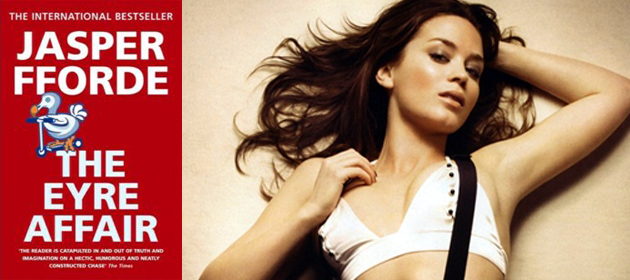
The Book: Jasper Fforde’s imaginative novel takes place in a parallel universe in 1985 where resourceful literary detective Thursday Next (a tough-as-old-boots member of the literary crimes division of Special Branch) must rescue Jane Eyre, who has been kidnapped from the pages of her novel by a fiendish criminal. Whimsical, funny, and crucially, a gripping page-turner.
The Movie: As TV show Lost In Austen proved, there’s a real market for this sort of metaphysical fantasy, and we’d love to see the ever-inventive Charlie Kaufman turn his attentions to directing duties.
As for who should play Thursday Next, we think Emily Blunt has the requisite combination of balls and beauty to pull it off.
Sample Dialogue: “My pager had delivered a disconcerting message; the unstealable had just been stolen. It was not the first time the Martin Chuzzlewit manuscript had been purloined.
Two years before it had been removed from its case by a security man who wanted nothing more than to read the book in its pure and unsullied state. Unable to live with himself or decipher Dickens's handwriting past the third page, he eventually confessed and the manuscript was recovered. He spent five years sweating over lime kilns on the edge of Dartmoor.”
The Dice Man
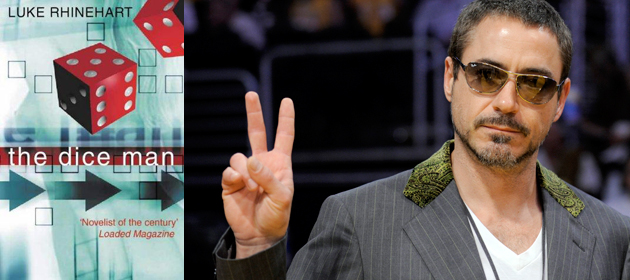
The Book: Luke Rinehart’s (the pen name of author George Cockcroft) cult novel tells the story of a disillusioned psychiatrist who decides to leave all of his life decisions down to the roll of a dice. Naturally, carnage ensues.
The Movie: A movie adaptation has long been mooted, but as yet, none has been forthcoming. It would surely be a dream of a role to play, but would require a healthy dose of counter-culture cool from whomsoever should step up to the plate. Our vote would go to Robert Downey Junior.
As for the director, this one requires a mixture of darkness and humour only Fincher could deliver.
Sample Dialogue: “A fog-horn blast groaned into the room from the East River and terror tore the arteries out of my heart and tied them in knots in my belly: if that die has a one face up, I thought, I'm going downstairs and rape Arlene. 'If it's a one, I'll rape Arlene,' kept blinking on and off in my mind like a huge neon light and my terror increased.
But when I thought if it's not a one I'll go to bed, the terror was boiled away by a pleasant excitement and my mouth swelled into a gargantuan grin: a one means rape, the other numbers mean bed, the die is cast. Who am I to question the die?”
Ordinary Thunderstorms
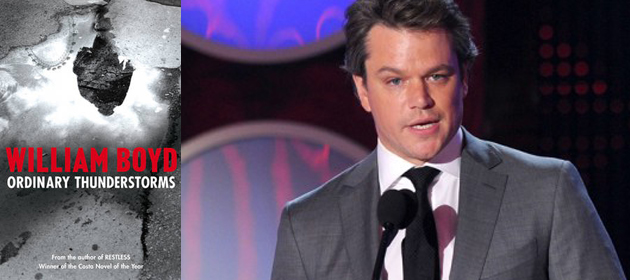
The Book: A taut little thriller from feted author William Boyd, in which climatologist Adam Kindred finds himself incriminated in a murder case and goes to ground amongst London’s seedy underbelly, living the life of a homeless man as he desperately tries to clear his name.
As he begins to discover that he is part of a massive corporate conspiracy, things become a little far-fetched, although when has that ever been a problem for Hollywood?
The Movie: Boyd’s lead character is cut from the same cloth as the classic Hitchcockian protagonist: an increasingly desperate everyman caught in the midst of events he doesn’t fully understand.
Being that this would likely be transposed to an American city, (New York perhaps) Matt Damon is probably the best suited of the current Hollywood crop to this sort of role, perhaps with Christopher Nolan behind the camera.
If it’s staying in London (as it ideally would), then Rufus Sewell might be a good pick.
Sample Dialogue: “He should NEVER have obeyed Wang's instruction, he now realised. He should never have pulled the knife out, never – he should have simply gone to the telephone and dialled 911 – 999, rather.
Now he had traces of Wang's blood on his hands and under his fingernails and, even worse, his fingerprints were on the fucking knife itself.”
George was once GamesRadar's resident movie news person, based out of London. He understands that all men must die, but he'd rather not think about it. But now he's working at Stylist Magazine.



